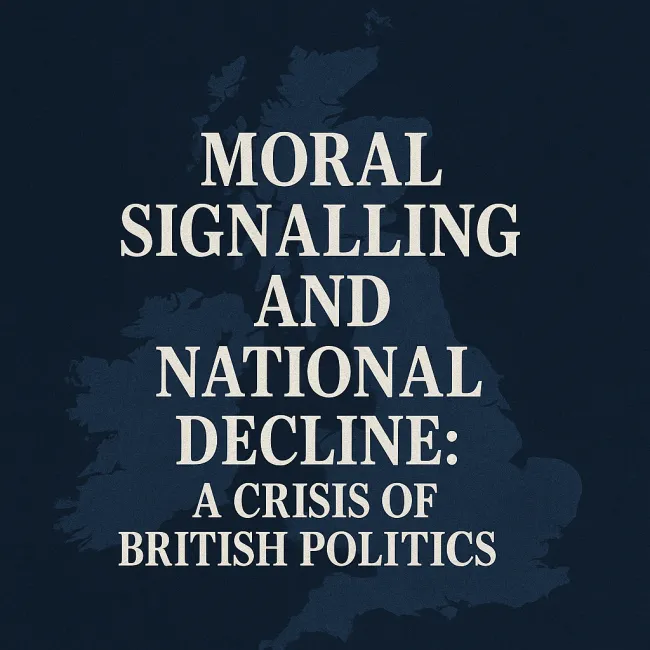
A striking gap now separates Britain’s governing class from the public it claims to represent. Voters sense that decisions affecting their livelihoods and communities are filtered through an ideological lens that prizes fashionable moral statements above practical and tangible outcomes. The result is a politics of display, where status-hungry figures in Westminster, or those connected to them, showcase virtue while leaving others to manage the costs. This is the hallmark of what has been called the luxury belief class:a group that signals moral virtue through beliefs that impose costs only on others.
Nothing illustrates this better than the politics of immigration. In recent years ministers removed the rule that made employers advertise vacancies domestically before recruiting abroad. That quiet administrative change signalled a broader retreat from any obligation to safeguard wages or job opportunities for local workers. It also confirmed to many that the party once expected to speak for provincial Britain is now fixated on approval from a metropolitan faceless audience both socially liberal and largely insulated from labour market competition.
A similar pattern appears in environmental policy. Ambitious net zero targets are announced with little regard for how they land in regions already struggling with stagnant productivity. Steel plants in the North, like Scunthorpe Steelworks which employs around 2,700 people, prepare for closure, energy bills rise, and the nation’s growth rate languishes near zero. Yet within the circles that shape policy these measures serve as badges of moral distinction, not triggers for sober economic accounting.
The underlying dynamic is reputational. Prominent figures affirm positions on diversity, climate, and openness precisely because those positions elevate them within a select peer group. Sociologists have noted that such beliefs function as luxury goods: they cost the believer nothing while signalling benevolence and sophistication. For families facing crowded schools, strained hospitals, or unaffordable housing the price is tangible, but the architects of these policies are rarely exposed to the same pressures.
Speech restrictions tighten the bind. Expansive hate crime frameworks and the recording of non-crime hate incidents discourage frank debate about outcomes. Sensitive subjects, including organised sexual exploitation of vulnerable girls, remained buried for decades because officials feared accusations of prejudice. Even after multiple inquiries exposed systemic failure, senior politicians still brand calls for a full national investigation as pandering to extremism. The message is clear: challenge the sacred narrative and you will be banished from respectable society.
Empirical work on the fiscal impact of recent migration supports public concerns. Studies focusing on low skill inflows from outside Europe find a net cost to the exchequer, especially when long term welfare and public service use are included. Yet these findings barely dent policy because they collide with an ideology that treats unrestricted mobility as a moral imperative. In effect the national budget is asked to underwrite virtue signalling exercises whose primary beneficiaries are those who declare them.
Party labels provide little relief. Conservatives, Labour, and Liberal Democrats alike compete to reassure the same professional class domiciled in a few postcodes of London and the university towns. The language differs at the margins, but the operating assumptions remain constant, appease the moral inner circle. Consequently the electorate is left with the form of pluralism but not its substance. Proposals that would restore border control, restrain energy prices, or rebalance regional investment surface only on the periphery of parliamentary life. Even recently those in power have ignored the voices of a vocal but disregarded number of citizens, playing ignorant to petitions that would push back against legislation and decisions that benefit only them and their perceived moral standings.
Some argue that institutional reform or a new political vehicle is now essential. Others hope internal revolts will force a reset. What cannot be disputed is the urgency. Britain faces flatlining living standards, widening fiscal deficits, and collapsing public confidence. These are not side effects of global trends. They are products of deliberate choices made by people more concerned with broadcasting moral superiority than with delivering material security.
A politics grounded in reality would begin by recognising trade offs rather than denying them. It would measure success in rising wages, reliable infrastructure, and safer streets, not in applause at international conferences. Most of all it would accept that national community imposes duties on leaders to put the interests of their fellow citizens first.
Until that change comes, Britain will drift. Moral posturing will continue to disguise economic failure, and every grievance ignored will deepen the divide between the public and the ruling class. A serious political movement must break this illusion, speak plainly, and demand that policy be measured by real-world outcomes, not elite self-congratulation. The country cannot afford delay. Britain needs Reform. Britain needs Reform!